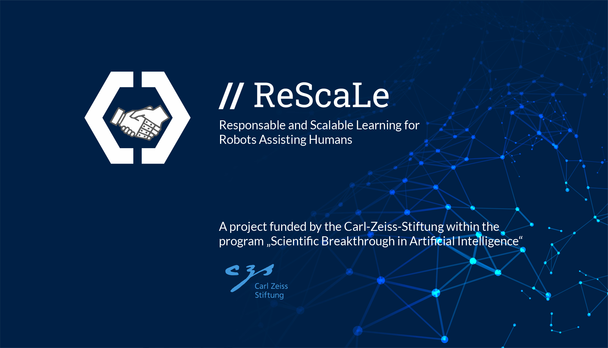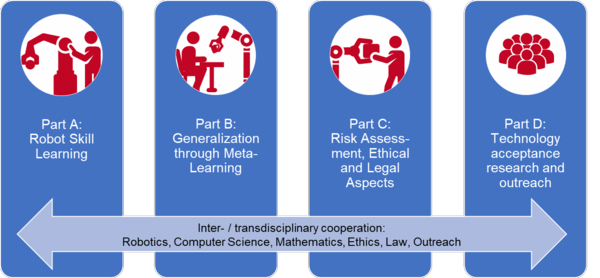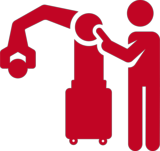 Responsible and Scalable Learning for Robots Assisting Humans
Responsible and Scalable Learning for Robots Assisting Humans
KI-basierte Roboter sollen zahlreiche Aufgaben in unserer Gesellschaft unterstützen, indem sie beispielsweise den Menschen im Alltag assistieren oder Produktionsprozesse effizienter gestalten – allerdings gehören sie trotz rasanter Forschungsfortschritte noch nicht zu unserem Alltag. Um sie integrierbarer für den Alltag zu gestalten, wird ReScaLe zum einen die noch bestehenden technischen Herausforderungen im Bereich des maschinellen Lernens bearbeiten. Zum anderen wird das Projekt auch soziale, ethische und rechtliche Aspekte berücksichtigen, um das Vertrauen in diese Systeme zu stärken.
Roboter sollen Aufgaben von Menschen erlernen, indem sie ihnen vorgeführt werden
Innovative Methoden des maschinellen Lernens sollen ReScaLe-Robotern die Möglichkeit geben, Aufgaben von Menschen zu erlernen, indem sie ihnen vorgeführt werden. Damit Roboter die Lernaufgabe effizient erfüllen können, entwickelt ReScaLe neue Ansätze, um die Anzahl der erforderlichen Demonstrationen zu minimieren. Das Forschungsprojekt wird neuartige unüberwachte und selbstüberwachte Deep-Learning-Methoden einführen, die nur eine kleine Menge an kommentierten Daten benötigen. Weitere innovative Verfahren unterstützen das Deep-Learning zudem im Umgang mit Unsicherheiten, um die Dateneffizienz noch weiter zu verbessern.
ReScaLe wird gleichzeitig den Weg für verantwortungsvolle KI- und Roboteranwendungen auf der Grundlage der Menschenrechte ebnen und einen integrierten mehrstufigen Ansatz verfolgen, der die ethisch-rechtlichen normativen Anforderungen in Verbindung mit den Risiken für die zentralen Rechte und Interessen sowie die nutzer*innenorientierten Designanforderungen berücksichtigt. Speziell zugeschnittene partizipative Aktivitäten zur Öffentlichkeitsarbeit begleiten das Projekt, um die Akzeptanz in der Gesellschaft zu fördern und eine bidirektionale Kommunikation mit den Forschenden zu ermöglichen.
An ReScaLe beteiligen sich Forscherinnen und Forscher aus den Bereichen Informatik, Ethik, Mensch-Maschine-Interaktion, Recht, Mathematik und Robotik. Das Projekt stärkt das Profilfeld „Datenanalyse und Künstliche Intelligenz“ der Universität Freiburg und wird im Forschungsgebäude ‚Intelligent Machine-Brain Interfacing Technology‘ (IMBIT) angesiedelt sein.


Part A: Methods for robot skill learning in human-centered environments through imitation and reinforcement learning
In this part of the project, we will investigate robot skill acquisition through imitation and reinforcement learning in human-centered environments. The robot used in this context consists of a mobile base with a height-adjustable arm. It is further equipped with multiple RGB-D cameras to perceive the environment. We will set up a real-world kitchen environment in which the developed learning methods will be evaluated on tasks such as setting a table, tidying up, or sorting groceries into cupboards. Hence, the required robot skills will range from simple pick-and-place actions to more complex trajectory-dependent actions such as opening cabinets or handing over objects.

Part B: Generalization of skills across different tasks and environments using meta-learning techniques
In this part of ReScaLe, we will set up multiple additional distinct kitchen environments to develop and evaluate transfer learning techniques. Among these different households, the robot tasks will be similar but have to be carried out with different objects, different contexts, and different goals. We will set up multiple identical robot platforms, such as the one described in Part A, that will learn and train skills in parallel in the different environments while sharing their experience.

Part C: Assessment of uncertainty in learned models, risk management, and ethical and legal basis and implications
In this part of the ReScaLe project, we lay the foundations for risk-sensitive and safe human-robot interaction by improving uncertainty estimates of deep learning models. We will quantify properly what these models do not know, especially in the context of sequential decision-making problems, which are relevant for all of the learning procedures considered within ReScaLe. These improved uncertainty estimates will provide improved risk management approaches and permit procedures to govern the interaction of AI-driven robots with humans. Towards this end, we will analyze legal and ethical requirements for a responsible research and innovation approach to develop AI-based robotics systems, and generate empirical data through participatory ethics research with different stakeholder groups; eventually, we will integrate the findings into a multi-level framework for responsible AI and robotics that can serve as a blueprint for legally and ethically aligned research in this field.

Part D: Technology acceptance research and outreach
This part of the ReScaLe project will facilitate a mutual transfer of knowledge between scientific and non-scientific actors. In this part, (preliminary) results of the ongoing research process of all WPs converge and are disseminated to society in innovative formats of public outreach and knowledge transfer. The aim is to foster highly open-minded and sincere discussions between researchers and the public on the societal and ethical implications of assistive AI systems and to provide approaches of reverse communication from society to academia. The participatory exchange will provide the basis for developing a novel model of technology acceptance related to human-robot interactions.
